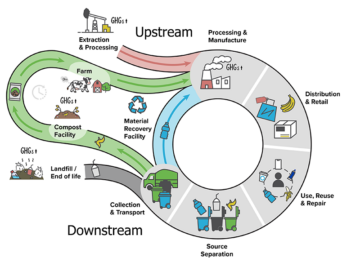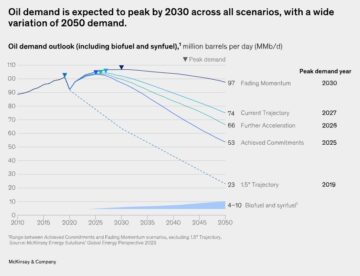
Let’s not mourn the recent announcement that Unilever is shrinking its sustainability goals. Let’s celebrate it.
Late last month, Hein Schumacher, the consumer product giant’s CEO, revealed in an investor call his company’s plan to refocus its sustainability goals to be less aspirational and more tangible. Some of his and other companies’ long-term, big-picture goals, he noted, haven’t really been effective.
“In recent years, debate around brands’ sustainability and purpose has arguably generated more heat than light,” he said.
Going forward, Unilever will abandon goals where they don’t align with a particular brand or product in favor of those that have a material impact for the company and its stakeholders.
It turns out that the sprawling sustainability commitments by the maker of Hellmann’s mayonnaise may have been spread a bit too thinly.
“We have too many long-term commitments that failed to make a sufficient short-term impact,” Schumacher said.
Unilever’s move is a tacit recognition that the world has changed as it relates to sustainability and a company’s purpose. The volatility of today’s world, financially and otherwise, along with the anti-woke pushback companies have received on both sides of the Atlantic, is forcing firms to take a harder look at how closely sustainability supports profits and productivity. Where it doesn’t, it is being questioned and, in Unilever’s case, reimagined.
The era when companies could make bold, audacious commitments without specifying how or when they’ll achieve them is ending.
Unilever’s stated purpose is “to make sustainable living commonplace.” That verbiage is a legacy of the Sustainable Living Plan the company launched in 2010 to much fanfare (among sustainability leaders) and more than a little head-scratching (among analysts and business leaders). The plan set forth 10-year corporate goals for everything from carbon emissions and water use to global nutrition and poverty.
The project helped burnish the sustainability leadership of Paul Polman, who served as CEO from 2009 until 2019. Since stepping down, Polman has become one of the leading voices in the sustainable business world, most recently focusing on how companies can become “net positive” and how executives can become more “courageous” when it comes to addressing the world’s biggest environmental and social challenges.
In many ways, Unilever’s shift isn’t unexpected. Post-Polman, the company has been under increased pressure to demonstrate how its sustainability focus benefits shareholders, including a growing chorus of rowdy activist investors. Last year, when Reuters spoke with a dozen of Unilever’s largest shareholders, most praised the company for putting sustainability issues front and center, although half said they hoped the company’s leadership would provide greater clarity on how it would balance sustainability with financial performance.
Grandiose to greenwash
Schumacher’s new focus on shorter-term, more tangible goals may, paradoxically, be the right move at a time when firms are being accused of short-term thinking. Too many companies have committed to 2040 or 2050 goals without sufficient accountability as to what happens between now and then. Some of those long-term goals rely on technologies that are variously unproven, unreliable or uneconomical, leading many activists to view them as anything from grandiose to greenwash.
Moreover, the era when companies could make bold, audacious commitments without specifying how or when they’ll achieve them is ending. Where such aspirational commitments were once seen as laudable — Apple’s vision to someday source 100 percent of its metals from recycled sources is a good example — such aspirations are viewed far more skeptically if companies can’t show realistic targets and timetables.
Under the new regime, Unilever will focus its sustainability initiatives on four pillars, including climate, nature and biodiversity, plastic waste and the livelihood of its customers, communities and suppliers. Rather than setting company-wide goals, it will be up to individual division heads and brand owners to determine which metrics, if any, to use to assess progress.
That could complicate reporting and transparency, particularly if the end product is a mishmash of metrics that can’t be easily compared or aggregated for consumption by the various NGOs, reporting services, investors and regulators interested in such data.
Schumacher’s plan raises questions that are important not just to Unilever, but also to other large companies, especially those with diverse and sprawling product lines and supply chains: As they pursue sustainability, should companies aim to get a few things right, or be all things to all stakeholders? Should goals be centralized or set and measured by those closer to the front lines? How should companies balance short-term versus long-term commitments?
Schumacher’s new roadmap shows that goals, aspirations and metrics may need to be reprioritized, even as companies are pressed to meet ever more ambitious and expansive targets. It also represents a maturing of the sustainability field, and the need by companies to focus squarely on material impacts that drive both financial and sustainability outcomes.
And it may give pause to executives whose companies have set forth lengthy to-do lists — or have been handed such lists by customers, investors or activists. It may be time to push back on these broad-brush mandates when they don’t comport with a company’s actual activities and impacts.
- SEO Powered Content & PR Distribution. Get Amplified Today.
- PlatoData.Network Vertical Generative Ai. Empower Yourself. Access Here.
- PlatoAiStream. Web3 Intelligence. Knowledge Amplified. Access Here.
- PlatoESG. Carbon, CleanTech, Energy, Environment, Solar, Waste Management. Access Here.
- PlatoHealth. Biotech and Clinical Trials Intelligence. Access Here.
- Source: https://www.greenbiz.com/article/why-unilevers-downshift-sustainability-good-news
- :has
- :is
- :not
- :where
- $UP
- 100
- 2009
- 2019
- 2050
- 7
- 8
- a
- About
- accountability
- accused
- Achieve
- Activist
- activists
- activities
- actual
- addressing
- aim
- align
- All
- along
- also
- Although
- ambitious
- among
- an
- analysis
- Analysts
- and
- Announcement
- any
- anything
- ARE
- arguably
- around
- AS
- assess
- At
- audacious
- back
- Balance
- BE
- become
- been
- being
- benefits
- between
- Biggest
- Bit
- bold
- both
- Both Sides
- brand
- business
- Business Leaders
- business news
- but
- by
- call
- CAN
- carbon
- carbon emissions
- case
- celebrate
- Center
- centralized
- ceo
- chains
- challenges
- changed
- clarity
- Climate
- closely
- closer
- comes
- commitments
- committed
- Communities
- Companies
- company
- Company’s
- compared
- consumer
- consumption
- Corporate
- could
- Customers
- data
- debate
- demonstrate
- Determine
- diverse
- Division
- Doesn’t
- Dont
- down
- dozen
- drive
- easily
- Effective
- Emissions
- end
- ending
- environmental
- Era
- especially
- Ether (ETH)
- Even
- EVER
- everything
- executives
- expansive
- Failed
- far
- favor
- few
- field
- financial
- financial performance
- financially
- firms
- Focus
- focusing
- For
- forcing
- forth
- Forward
- four
- Free
- from
- front
- generated
- get
- Give
- Global
- Goals
- good
- greater
- Growing
- Half
- happens
- harder
- Have
- he
- heads
- helped
- his
- How
- HTTPS
- if
- Impact
- Impacts
- important
- in
- Including
- increased
- individual
- initiatives
- interested
- investor
- Investors
- issues
- IT
- ITS
- jpg
- just
- large
- largest
- Last
- Last Year
- latest
- leaders
- Leadership
- leading
- Leading Voices
- learning
- Legacy
- less
- light
- lines
- Lists
- little
- living
- long-term
- Look
- make
- maker
- mandates
- many
- material
- May..
- measured
- Meet
- Metals
- Metrics
- Month
- more
- most
- move
- much
- Nature
- Need
- net
- New
- news
- Newsletter
- NGOs
- node
- noted
- now
- nutrition
- of
- on
- once
- ONE
- or
- Other
- otherwise
- our
- out
- outcomes
- owners
- particular
- particularly
- Paul
- pause
- percent
- performance
- pillars
- plan
- plastic
- plato
- Plato Data Intelligence
- PlatoData
- positive
- Poverty
- Praised
- pressure
- Product
- productivity
- profits
- Progress
- project
- provide
- purpose
- pursue
- Push
- push back
- Putting
- Questioned
- Questions
- raises
- rather
- realistic
- really
- received
- recent
- recently
- recognition
- recycled
- regime
- Regulators
- reimagined
- relates
- rely
- Reporting
- represents
- Reuters
- Revealed
- right
- roadmap
- Said
- seen
- served
- Services
- set
- setting
- Shareholders
- shift
- short-term
- should
- show
- Shows
- Sides
- since
- Social
- some
- someday
- Source
- Sources
- sprawling
- spread
- stakeholders
- stepping
- such
- sufficient
- suppliers
- supply
- Supply chains
- Supports
- Sustainability
- sustainable
- Take
- tangible
- targets
- Technologies
- than
- that
- The
- the world
- Them
- then
- These
- they
- things
- Thinking
- those
- time
- to
- today’s
- too
- Transparency
- Trends
- turns
- under
- Unexpected
- unilever
- until
- use
- various
- Versus
- View
- viewed
- vision
- VOICES
- Volatility
- Waste
- Water
- ways
- we
- weekly
- were
- What
- when
- which
- WHO
- whose
- why
- will
- with
- without
- world
- world’s
- would
- year
- years
- zephyrnet











